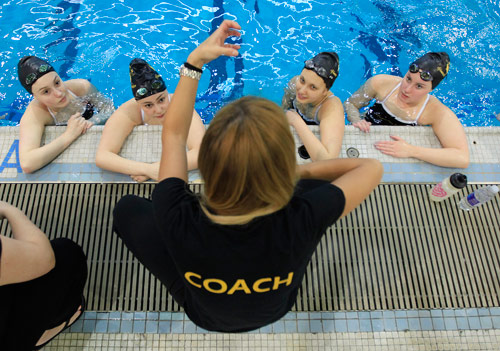When outside influences affect performance – a caring coach can help players both on and off the field
Jan 04, 2016

Originally published in Coaches plan by the Coaching Association of Canada on coach.ca and written by Dr. Shaunna Taylor, PhD from the Canadian Sport Psychology Association. (Original post available here).
Photo courtesy of Coaching Association of Canada.
 There’s a saying in coaching literature that “coaches coach people, not sports.” Each athlete comes to your program with an individual biography that will unfold as you get to know them. Athletes and coaches don’t live in a bubble – they come from families, communities, and socio-cultural groups that can have a significant impact on who they are, and the types of beliefs and behaviours they hold.
There’s a saying in coaching literature that “coaches coach people, not sports.” Each athlete comes to your program with an individual biography that will unfold as you get to know them. Athletes and coaches don’t live in a bubble – they come from families, communities, and socio-cultural groups that can have a significant impact on who they are, and the types of beliefs and behaviours they hold.
Current research indicates that many young people don’t have the resiliency skills of previous generations. For example, in a 2012 article titled “Campus Crisis: The broken generation,” Maclean’s reported on a survey of 1,600 University of Alberta students which found that 51 percent experienced feelings of hopelessness in the past 12 months and 87 percent felt overwhelmed by all they had to do.
Studies like these show why it’s so important to stay connected with your athletes, to understand the outside factors that influence them in profound ways, and to use coaching leadership to positively influence them when these outside factors become pervasively negative.
As a coach, you are a natural problem-solver. And yet, there may be times when an athlete’s athletic performance or declining physical or mental health may be beyond the scope of your abilities to solve. In this case, the coach serves as a “triage”: a valuable ally in directing the athlete to the appropriate assistance and/or empowering them to find solutions.
A guiding compass
Many behaviour or performance challenges in sport can be addressed through communication and the training of the athlete’s mental skill and physical ability. But sometimes, even these efforts fall short and a coach might suspect that something else is at play. In addition to parents and teachers, coaches are in a uniquely powerful position to effect change in young people. In many cases, a coach and sport program can serve as an athlete’s “true north”: a compass to help direct young people to positive solutions, and give them hope and a sense of normalcy when other aspects of their lives feel out of control. Many athletes look back on their early years in sport with gratitude. I’ve heard more than one athlete say later in life that sport gave them the life skills and the social group to help them deal with the pressures of growing up.
Putting an ‘open door policy’ into practice
Many coaches say that they have an open door policy with their athletes, but they may struggle with creating conditions that actually put it into practice. Great coaches understand how critical it is to convey to athletes that you care about them as people, and not just as athletes. This applies whether you are working in recreational sport or in high performance. The athlete who feels valued and cared for will be more likely to work harder and perform better than the athlete who feels like they are just a number.
How you establish this sense of caring is your challenge as a coach. The sense of mutual trust that must also be created is key if you are ever to have an athlete come to you with an important and private issue. Remember: people judge others on actions, not words. If your team has seen you violate confidentiality or use personal information to a teammate’s detriment, athletes will think the same could happen to them.
Be prepared to listen
There could be literally hundreds of reasons why your athlete isn’t feeling or acting like him or herself on any given day. It could be fatigue, school stress, or any number of personal or family issues or crises (such as having a critically ill friend or family member, struggles with alcohol or drug abuse, financial stress or job loss, etc.). Or it could be something else, such as school bullying, physical, emotional or sexual abuse, a break-up, or an underlying mental illness or a mental health issue. A young person could also be having a hard time because they are struggling with sexual or gender identity issues. Truth is, you don’t always have to have the “right” answer or solution if an athlete reaches out or opens up to you — but you can be a huge positive role model by being there to listen. Unless the athlete is a danger to him or herself or others (in which case you have a legal obligation to report your concerns), your key role is to be able to provide resources that can provide help to the athlete.
Keep in mind it’s imperative to have a clear understanding of boundaries around ethical decision-making and codes of conduct for communicating with minors on sensitive topics (a valuable resource to help in this area is the Coaching Association of Canada’s Make Ethical Decisions training.
Not every athlete will come to you with an issue they are struggling with, but there are times that your level of concern about a particular athlete will be high enough that you’ll need to say, “You just don’t seem like yourself, and I’m concerned about you.” Don’t be afraid to let an athlete know you care. Depending on the level of concern you have, you may need to reach out to an athlete’s parents or guardians. Become acquainted with the available supports and resources in your community, so that you’ll know how to help your athlete. And keep it mind that’s it’s better to reach out – even if you discover the problematic issue is relatively minor – than to have the situation escalate and wish you’d acted sooner.
Chances are, you are not a clinical psychologist, a social worker, gender or sexual identity specialist, or a family therapist. But you can assist your athlete in reaching out to professionals who can help them. Never forget how crucial a coach can be in a young athlete’s life.
Building trusting relationships
It takes time and energy to build trust. But any good coach knows that the effort is well worth it. Trusting teams are also healthier and higher performing teams. And an athlete who trusts in their coach is more likely to open up to him or her when help is needed.
Shaunna Taylor, PhD, is co-chair of the managing council of the Canadian Sport Psychology Association and an adjunct professor at the University of British Columbia. She has been consulting with coaches and athletes from the grassroots level to the Olympic/Paralympic level for more than 15 years.
Resources that can help
Instead of worrying that one day an athlete might come to you with a tough topic and you won’t be prepared, begin to educate yourself on local or national resources (including websites and associations) that can help athletes and/or their families. You may never need to use these resources, but if you do, you’ll be ready.
- Kids Help Phone: For any crisis, or if a young person just needs to talk, young people of all ages can call 1-800-668-6868 or visit www.kidshelpphone.ca
- It Gets Better Project: This project’s mission is to communicate to lesbian, gay, bisexual, and transgender youth around the world that it gets better, and to create and inspire the changes needed to make it better for them. www.itgetsbetter.org
- Canadian Mental Health Association: The CMHA promotes good mental health and advocates for change. Find a support group in your area. www.cmha.ca
- Teen Challenge Canada: A 12-month, faith-based, residential drug and alcohol rehabilitation program that is part of a network of more than 15 Teen Challenge Centres across Canada and more than 1,000 worldwide. www.teenchallenge.ca
Coaches plan is an online magazine for Canada’s coaches published three times a year by the Coaching Association of Canada. To read more Coaches plan articles, please visit coach.ca.
